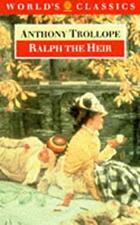
The opening of Ralph the Heir (1871) is marred slightly by a preponderance of Ralph Newtons. One is heir to the estate of Newton Priory and thoroughly unworthy of the honour; the other is his cousin, an affectionate and scholarly type who everyone would prefer to inherit the family wealth.
In anticipation of his fortune, Bad Ralph has racked up a considerable debt to his breechesmaker, the ambitious Mr Neefit. Eyeing the prospect of social advantage, Neefit pledges to write off the debt and provide a £20,000 dowry if Ralph agrees to marry his daughter, Polly. He waxes lyrical as to her advantages and youthful charms: “There ain’t no mistake there, Mr. Newton; no paint; no Madame Rachel; no made beautiful for ever! It’s human nature what you see there, Mr. Newton.” Poor Polly has no interest in her impecunious suitor, protesting: “I’m not going to be given away, you know, like a birthday present, out of a shop. There’s nobody can give me away, father,–only myself.” She knows her place, and her own mind.
Polly’s heart belongs to Ontario Moggs, the son of a successful bootmaker who is angling to become a politician (he has taken over from Septimus Traffic as my favourite Trollope name). Trollope lavishes disdain on Moggs as one who is trying to get above his station, eschewing his trade and instead lecturing on the rights of man at the Cheshire Cheese pub. We know that Trollope disapproves of his nascent socialist as he endows him with the belief that women should be enfranchised. Moggs fights Ralph’s guardian Sir Thomas Underwood for a seat in the general election, a series of scenes based on Trollope’s own failed Westminster ambitions.
Along with Mr Neefit and his breeches, Underwood provides much of the novel’s comic relief. Now an old man, he has been working on his Life of Bacon (the philosopher, rather than piggy products) since the age of 25 and still hasn’t written a single word. He is paralysed with self-doubt, a position with which many PhD researchers will sympathise.
Elsewhere, the narrative is more contemplative, with Trollope seemingly transported to Elsinore and remarking that it is:
“impossible to keep down the conviction that everything is vanity, that the life past has been vain from folly, and that life to come must be vain from impotence. It is the presence of thoughts such as these that needs the assurance of a heaven to save the thinker from madness or from suicide. It is when the feeling of this prevailing vanity is strongest on him, that he who doubts of heaven most regrets is incapacity for belief.”
He apologises for presenting the reader with an “indifferent hero”, but pleads that we should be “taught to see the men and women among whom we really live”.
Like George Hotspur in Sir Harry Hotspur of Humblethwaite, Ralph has a “double memory, and a second identity”. He is able to justify his actions to himself and to view them in an artificial light. In his Autobiography, Trollope described Ralph the Heir as “one of the worst novels I have written,” concluding that “a novelist after fifty should not write love-stories.” It’s really not that bad, although is certainly a curate’s egg. There are comic flashes, political shenanigans and some moving outbreaks of filial affection. And, of course, there is the nominative delight of Ontario Moggs.
Ralph the Heir by Anthony Trollope